- Home
- Mordecai Richler
A Choice of Enemies Page 6
A Choice of Enemies Read online
Page 6
“All right,” she said. “If you like.”
This time when she rose to fill his glass again, and Norman circled her waist with his arm, she did not withdraw or look at him severely. Instead she came closer to him.
“Oh please,” she said. “Hurry. I want you to.”
He raised a hand to her breast. Sally shut her eyes, murmured something inaudible, and fitted her body closer to his. As they sank down on the bed together he began to undo the buttons of her blouse. Sally leaped up, her slip coming off with a black swish, and in a moment she stood naked before him.
“You’re beautiful,” he said.
Then, as they fell into another embrace, the phone began to ring. That startled them. Norman sat up, he began to sweat. The phone rang again and again. Sally, trying to pull him down to her, said huskily, “Let it ring. Who cares?”
It was Joey. He knew it. Anger knotted inside him.
“It’s probably not for me.” Sally offered him her mouth again, but as he took her in his arms the phone rang and rang. A buzzer sounded. Obviously the phone call was for her.
“All right,” she said sharply. “I’ll get it.”
But just as she reached the phone the ringing stopped. Standing there in the nude on a cold floor, a dead receiver in her hand, she was consumed by a searing rage, but she did not weep.
“I can’t understand,” Norman said, “at this hour … who …?”
Norman slipped into his trousers. Sally poured her slip over her head, wriggling to help it down, and then sank wearily back on the bed. She rose quickly again and poured him another drink.
“I suddenly feel like the heroine of a smutty story. You know, the school teacher visiting Europe and.…”
“I’m sorry.”
“You needn’t be sorry.”
Norman got up and replaced the receiver on the hook.
“Say something,” she said. “Please.”
“I could tell you how I feel about you, but I’m afraid –”
“– of Joey?”
“Why should I –”
“I was only joking,” she said.
“It was a bad joke.”
“All right. It was a bad joke. I’m sorry. But there’s no need for you to be angry.”
“I’m not angry.”
He took her in his arms once more. They kissed; he fondled her breast. But it was no use. It was too late. They broke apart.
“Oh,” she said. “I feel like I’m being scratched all over inside. I feel terrible.”
Norman frowned helplessly. His excitement, his longing for her, had been so urgent, that he had reached a climax while they had embraced. Now, all excitement temporarily spent, he felt tense. Though he ached with love for her, he was afraid that if he was called on right now he would prove inadequate, so Sally’s presence embarrassed and angered him, and with himself he was absolutely disgusted. Norman reached for his jacket.
“Don’t go,” she said. “Stay and have another drink.”
“No. I must go. That was probably Joey on the phone.”
“So what. Do you think I care if she knows you spent the night here?”
This was an invitation. He realized that. But he didn’t sit down again; he slipped into his jacket.
“I’ve hurt you,” she said.
“No.”
She came close to him. “I like you so much, Norman Price,” and rested her head against his shoulder. “Are you very angry with me?”
“No,” he said. “No, my darling,” and he was gone.
“Darling.” Sally was alarmed. Coming from Norman “darling” was far too solemn. He had never called her “darling” before.
IX
Charlie and Joey were ready for bed when Norman arrived.
“Ah,” Charlie said, “here he is.”
Norman turned angrily on Joey. “Did you phone Sally about half an hour ago?”
“Yes,” she said coldly. “Why didn’t you answer?”
“It looks to me that you phoned at one in the morning simply to see if I was with her.”
“A telegram came for you. I thought it might be important.”
“I told her that it could wait until you got back.”
“A telegram?”
“It must have come this afternoon,” Charlie said. “I went out for a coffee and found it in the mail box. Here, maybe you won something on a quiz show.…”
But Norman turned very pale.
“Anything wrong?” Joey asked.
“What is it, Norman?”
“It’s from my Aunt Dorothy in Boston.…”
“What?”
“Nicky’s dead.”
“Who?”
“His brother.”
“There are no details,” Norman said. “Nothing.”
“Oh, Norman, I am sorry,” Joey said.
Norman retreated into his cramped little study and shut the door after him. He sat down on the tattered sofa and read the telegram over and over again. Removing his glasses, he wiped his eyes and lay down on the sofa and rested there until a soft knocking at the door startled him.
“Can I get you anything?” Joey asked.
“No.”
“A drink might help,” Charlie suggested meekly.
“No. No thanks.”
“Are you sure?”
“Please go away.”
Before he turned out the lights, Norman wrote out his name and address on a piece of paper and fastened the paper to his arm with an elastic band. Eventually he got up and undressed, but he didn’t sleep.
Dawn came. Buses began to lumber down Church Street.
Tall, he thought. Nicky had been tall with our father’s eyes and smile and with a lot of Dr. Max Price’s brilliance too. Nicky had inherited the gift, not me.
Norman got up at last around ten and joined Charlie and Joey in the kitchen.
“Did you sleep?” Joey asked.
“Yes.”
“I guess there’s nothing I can say, is there?”
“I’m O.K., Charlie.”
Joey served him coffee. “You were very fond of him, weren’t you?”
“I’d rather not talk about it.”
But he was grateful to both of them just for being there. They were old friends. He wasn’t required to show a stiff upper lip or a drooping one, either. Being himself was good enough for Charlie and Joey.
The bells of St. Mary Abbot’s began to chime.
“Sally phoned,” Charlie said cheerfully. “She seems to think you’re angry with her or something.…”
“Look, Charlie, there is something you can do for me. Would you call Air France and see if you can get me on the next plane to Paris?”
Charlie looked imploringly at Joey.
“Go ahead,” Joey said. “It’ll do Norman good to get away.”
Charlie went into the living room to phone.
“What happened?” Joey asked. “Is it the girl?”
“Her name is Sally,” Norman said sharply. Then, as he told her something of Sally, he realized for the first time that he was grateful that Joey had phoned last night. He had been afraid to make love to Sally.
“So you’re going to use your brother’s death as an excuse for running away.”
Norman did not want to discuss Sally any more. Not this morning. “Jesus,” he said, “I’m not serious about her. I –”
“Are you sure?”
“Of course I’m sure. I wanted to go to bed with her, that’s all.”
“You’re sure you’re not running –”
“I’m not running away.”
The bells of St. Mary Abbot’s started up again.
“What am I to tell her if she phones again?”
“Tell her anything you want.”
“O.K.,” Charlie said. “You leave in two hours. Is that too soon?”
“No. Thanks a lot, Charlie.”
“How long will you be gone?” Joey asked.
“A couple of months at least.”
&n
bsp; “Look,” Charlie said, “I’m flat broke right now but –”
“I don’t need any money, Charlie.”
“– but I’m going to see Winkleman in half an hour, he phoned earlier, and I’m getting a pretty big advance on my script to begin with, so –”
Norman’s face clouded. “Don’t tell him I’m going away.”
“Why?” Joey asked quickly.
“No special reason,” Norman said. “I’ll write him.”
It’s no use, Norman thought. Charlie won’t get a second payment until I get back. I hope he isn’t counting too heavily on the money.
The bells of St. Mary Abbot’s began to chime again.
“I’m going out for a walk,” Norman said. “See you soon.”
Joey poured Charlie another cup of coffee.
“Poor guy,” Charlie said at last.
“He’s a coward,” Joey said.
“A coward? It’s not easy, you know. He was crazy about his brother.”
“Norman has never faced a crisis in his life. He’s always run away.”
“You know,” Charlie said. “You know everything.”
X
A mist rose from the Seine. Ernst yawned. All his bones ached. The bum who was curled up next to him on the cobblestones began to cough wetly again. Ernst was afraid that he was dying. He ran off into the night to the nearest café and returned with a small bottle of cognac. The bum accepted his drink gratefully, but just as Ernst was falling asleep a few moments later, his coughing worsened. Ernst took the bum into his arms and pressed more cognac on him until he passed out or fell asleep; Ernst couldn’t tell for sure. By then it was nearly 5 a.m. The bums began to stir as one by one they were nudged by the sun. An old man rose and stretched. Another, still stiff with sleep, heaved his pack over his back and urinated under the bridge. Ernst rose and hopped first on one leg and then on the other. As soon as he felt warm enough he started up the concrete steps to the street.
This was Ernst’s tenth day in Paris and he was still without prospects. He had a letter from his mother. She was in Hamburg. She needed money. His father had sent him a postcard from Berlin. He needed money.
Ernst’s father was a grey, shrunken man with weak moist eyes and an annoying habit of bowing his head when he spoke with strangers. He had not always been like that. When Hitler had come to power Karl Haupt had not joined the Nazis, but neither had he worked against them. Always a little inclined towards anti-semitism, never very fond of the British, he had, nevertheless, found Hitler offensive. As he was in the legal business his attitude was very costly to his family. You could not practise law unless you were a party member. During the war Karl Haupt, who was in and out of the punitive camps, did odd jobs for lawyers. His friends pleaded with him to be sensible.
Karl, did not the Jews overrun most of the professions before Hitler?
Exactly.
Karl, isn’t it our sacred duty to defend the fatherland from the Jewish bolsheviks?
Exactly.
So Karl, why make it hard for yourself and your family? Join the party.
No, Karl would say, your party is rotten, and into prison he would go.
After the war Karl Haupt enjoyed a brief time of money for the first time in his life. The Americans made him a judge at minor denazification trials in a provincial town. As all his old advisers came up before him they got sentences of from six months to two years. Then, abruptly, the trials were over. A year, two years later, Karl Haupt was worse off than before. All the denazified were out of prison and back in the courts and, of course, they made sure that he got no work. So he took to the Soviet Zone, but there it was soon established that he had worked for the Americans and, what’s more, he would not join their party either.
Ernst lit a butt he had saved from the night before.
At Les Halles the higher sun bit ravenously into exposed crates of melons and lettuces and peaches. Ernst wriggled through the sharp-smelling maze to where M. Krespe stood with his grimy little pad.
“I told you to be here at four.”
“I asked them to wake me at my hotel,” Ernst said, “but they forgot.”
“That’s a good one. At your hotel, eh?”
Ernst helped unload crates of oranges until nine a.m., until two cuts in his hands had reopened and his back was knotted with pain, and then he had to hang around the café for another half hour before M. Krespe paid him. The sun was wide in the sky, this was going to be another white hot day. Ernst went to the Gare St. Lazare, had a cup of coffee at one of the wagons, and then went down to the toilets and rented a private cubicle and sat down and ate two oranges and a banana while he read a story by Kipling in a German translation. He dozed briefly. In his dreams he returned to the black market at the Potsdamerstrasse. Again the American soldier whom he had cheated the day before returned sobered and with two friends. Again he came to with his knife gone and his nylons gone and three teeth gone. The dream faded; Ernst woke in a sweat. He washed and shaved. But it was still too early. The boat-train wasn’t due for another twenty-eight minutes. So Ernst sat down on a bench opposite track nine and counted his money. Seven hundred and twenty francs. Not enough to get him to Dieppe. Not a big enough stake for London.
He fell asleep. Once again he sat on the bed, waiting for Nancy to come back to him. Once again instead of the thin pretty girl there came the familiar shriek of M.P. sirens. Fortunately the window was directly above the patio roof. From there, a leap into the garden would be easy, and he would be gone. But as he turned to raise the window he had been suddenly yanked from behind. There was Nicky, a smashed beer bottle in his hand, and a crazed look on his face.
“You son-of-a-bitch. First you steal Frank’s wallet, then you cost me one of my best friends, and now –”
“You don’t understand.”
“– and now you come upstairs to steal.”
In another moment, Ernst had thought, the M.P.s will be here.
“Get away. I’m going through the window.”
Ernst had tried for the window once more and Nicky, the smashed beer bottle in his hand, had rushed him. Ernst had tried to take him by force, but then, in the distance, he had heard the whine of another police siren, so he had pulled out his knife. Nicky had lost all semblance of individuality for him, he had become simply another opponent. Ernst had worked swiftly and accurate. Then, acting from the memory of other encounters, he had removed Nicky’s wristwatch, taken his papers, smashed the window with a chair, and jumped.
Ernst ran and ran and ran, until he had collapsed on the pavement in a little street in Schwabbing, the blood pounding through his head. His hand had been bloody. He had sat there – a panting, empty-eyed boy on the pavement – until he had risen at last and had been sick once, twice, in the gutter.
The following morning, and every morning since, he had rationalized his crime to himself, but once he was alone in the dark, the rationalizations had no longer served a useful purpose. Each night Nicky came and was knifed and murdered again.
Ernst jerked awake. A scream died, unheard, in his throat. Breathing heavily, he wiped his forehead with his arm.
After the boat-train arrived Ernst waited at the head of the platform until the people began to come through with their luggage. There were many Americans, more than he had hoped for, and at last he spotted a man of roughly his own size. The American was struggling with three pieces of luggage; he seemed baffled. Ernst hastened to his side.
“Porter?”
“I don’t think –”
But Ernst was already in charge. “There are two more inside,” the American said lamely, pointing at the train.
“Wait for me here. I’ll get you a taxi.”
Ernst picked up the heaviest of the three bags and boarded the train. Inside he picked up another bag and then raced ahead through four cars and descended to the platform again. By this time a camera was strapped to his side and he was wearing sun glasses. “Porter,” he called. “Porter.”
A p
orter picked up his bags and Ernst followed him through the gates.
“Vite,” Ernst said. “Je suis très pressé.”
Ernst gave the taxi driver the address of an hotel on the left bank. Inside the hotel he registered as D.H. Hollis, the name on his luggage tabs. He told the patron that he was in a hurry, he said that he had to get to the American Express before it closed and that he would return before evening to fill out the proper papers, then he followed a sluggish boy to a room on the third floor. As soon as the boy left, Ernst locked the door. Then, the shaking came. He tumbled on to the bed and brought his knees up to his chin and hugged himself tight. When the fear had passed again he took out his last cigarette and smoked it on the bed. He stepped out of the hotel again about an hour later. He wore a Brooks Brothers suit. Carrying a raincoat over his arm in spite of the cloudless skies, he took a bus to the Rue des Rosiers and entered a dark seedy café there. Albert bought the camera, a Leica, for about a quarter of what it was worth.
Ernst walked to a café in the Opera district, sat down on the terrace, and ordered a beer. This, he thought, is a good time for a spot of Selbst-Kritik. He had twelve thousand three hundred francs and some change. Ten thousand would go to his parents. The night mortician, he thought, will sell me identity papers for fifty thousand francs, but what then? My French is bad; I haven’t got a trade. A tall middle-aged Texan drifted down the street clutching his pretty wife like an all-day sucker. Lanky Swedes with packs on their backs, boys of his own age, passed brown and confident before him. Ernst took the newspaper clipping out of his pocket again. As a special service to tourists this summer, the clipping said, the British and French governments have agreed to allow all-day trippers to travel between Newhaven and Dieppe without passports. But if I’m going to London, he thought, I’ll need more money.
XI
A week later, in London, Sally went to visit the Lawsons.
“Look who’s here,” Charlie said, “the teach. Isn’t that wonderful, darling?”
Joey was typing a script for Charlie at Norman’s desk. Perhaps it was the horn-rimmed glasses, maybe it was just an off day, but she seemed depressed. Charlie, though, was in excellent spirits. Wearing a patched cardigan, corduroys, and slippers, he was perched high on a ladder, running gaily coloured streamers from wall to wall.

 Dispatches From the Sporting Life
Dispatches From the Sporting Life The Acrobats
The Acrobats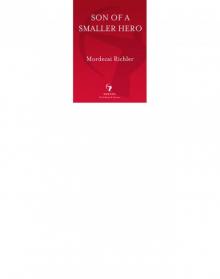 Son of a Smaller Hero
Son of a Smaller Hero Jacob Two-Two-'S First Spy Case
Jacob Two-Two-'S First Spy Case Jacob Two-Two Meets the Hooded Fang
Jacob Two-Two Meets the Hooded Fang Jacob Two-Two and the Dinosaur
Jacob Two-Two and the Dinosaur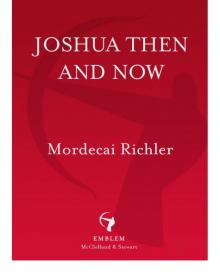 Joshua Then and Now
Joshua Then and Now Solomon Gursky Was Here
Solomon Gursky Was Here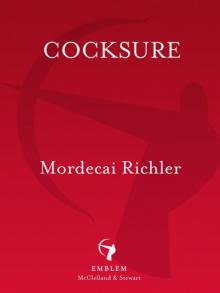 Cocksure
Cocksure The Street
The Street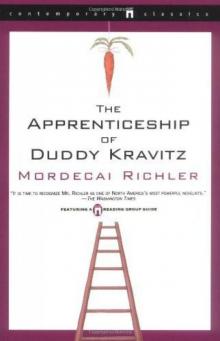 The Apprenticeship of Duddy Kravitz
The Apprenticeship of Duddy Kravitz A Choice of Enemies
A Choice of Enemies Barney's Version (Movie Tie-In Edition)
Barney's Version (Movie Tie-In Edition)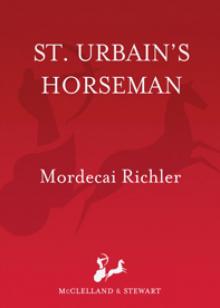 St. Urbain's Horseman
St. Urbain's Horseman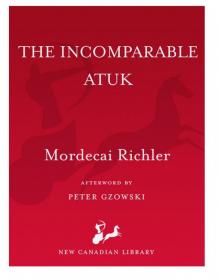 The Incomparable Atuk
The Incomparable Atuk Barney's Version
Barney's Version